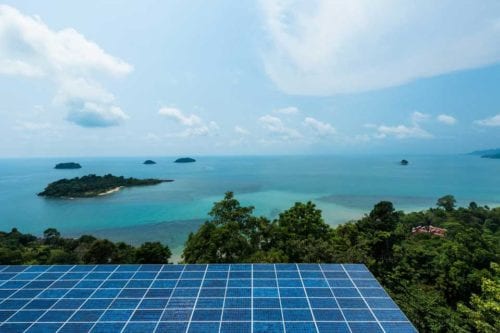
Report: In Nigeria, A New Business Model Enables Utilities to Provide Reliable Electricity to Large Commercial and Industrial Customers
A new RMI and Abuja Electricity Distribution Company (AEDC) report shows how electric utilities and distributed energy resource (DER) developers in Nigeria can collaborate to provide large commercial and industrial customers with reliable electricity.
Abuja, Nigeria – October 12, 2022
A new report released today by RMI and Abuja Electricity Distribution Company (AEDC) identifies a collaborative business model which enables distribution companies (DisCos) and distributed energy resource (DER) developers to provide clean energy to large commercial and industrial customers. This model can quickly improve electricity supply and sectoral viability for the commercial and industrial (C&I) sector, which is crucial to Nigeria’s economy, enabling financial savings, reducing risk and drastically reducing CO2 emissions.
Industrialization is growing in many sub-Saharan African countries. However, large C&I customers continue to be hampered by unreliable electricity supply. Inadequate and expensive electricity provision is reported to increase costs, disrupt production and reduce profitability. Consequently, most large C&I customers have resorted to fossil fuel-powered self-generation. The report, Improving Electricity Supply for Large Customers in Nigeria, provides a framework for collaboration between distribution companies (DisCos) and DER developers to provide C&I customers with cleaner, more reliable, and more affordable electricity.
Against the background of a maturing DER industry, innovation in business models driving down costs of solutions, an enabling policy environment, and low near-term prospects for improvement in supply from the national grid, Nigeria is poised for accelerated growth of DERs. C&I customers are at the forefront of this development, as they need reliable and affordable power and can pay for it. Large C&I customers are beginning to take advantage of declining renewable energy prices to install their own DER systems to reduce fossil fuel self-generation costs. RMI estimates that the market size for C&I DERs could be over 2 GW by 2030, a significant increase from about 20 MW today.
“By fostering collaboration between DisCos and DER developers, this innovative business model enables ‘win-win-win’ opportunities by reducing costs for large C&I customers, improving DisCos’ revenues and providing DER developers with access to a larger pool of customers,” said Suleiman Babamanu, RMI Nigeria program director. “We believe that this will accelerate the growth of the C&I solar market in Nigeria and make reliable electricity supply more efficient and affordable for a wider range of C&I customers.”
“Innovative business models of this nature will help AEDC improve its operating revenue, reduce technical, commercial, and collection losses whilst ensuring security of supply to increasing number of customers requiring reliable power for their homes and businesses,” said Collins Chukwuma Obi, head financial performance management of AEDC.
To support the broader sector in considering the model’s use, the report includes template contract documents to provide a starting point for collaborative project development. These include:
- A generic request for proposal (RFP) to enable DisCos and their large C&I customers to jointly procure a qualified DER developer
- A generic tripartite agreement to stipulate the contract terms among the DER developer, the DisCo, and the customer throughout the installation, operation and maintenance of the project
- A scoring matrix to assist in evaluating proposals received in response to the RFP
Although this model holds great promise for improving power supply in Nigeria, demonstration is needed. There is a clear opportunity for innovation and collaboration across the sector, where stakeholders — including DisCos, developers, policymakers, investors and development partners — can share insights from these pilot projects to refine and scale implementation.
Media Inquiries please contact:
RMI – Benson Kibiti, Strategic Communications Manager, bkibiti@rmi.org
AEDC – Donald Etim, Chief Marketing Officer, Donald.Etim@abujaelectricity.com
Notes to Editors
RMI Africa director Francis Elisha, Nigeria program director Suleiman Babamanu, and Omosede Imohe head corporate finance and strategy of AEDC will be available for comment.
The report was written with support from Good Energies Foundation
About RMI
RMI is an independent nonprofit founded in 1982 that transforms global energy systems through market-driven solutions to align with a 1.5°C future and secure a clean, prosperous, zero-carbon future for all. We work in the world’s most critical geographies and engage businesses, policymakers, communities, and NGOs to identify and scale energy system interventions that will cut greenhouse gas emissions at least 50 percent by 2030. RMI has offices in Basalt and Boulder, Colorado; New York City; Oakland, California; Washington, D.C.; and Beijing.
More information on RMI can be found at www.rmi.org or follow us on Twitter @RockyMtnInst.
About Abuja Electricity Distribution Company (AEDC)
Abuja Electricity Distribution Company (AEDC) is one of the 11 Nigerian power distribution companies that were privatized on November 1, 2013. AEDC has a franchise for the distribution and sale of electricity across an area of 133,000 km2 in the Federal Capital Territory and the states of Niger, Kogi, and Nasarawa. In addition, AEDC is required to manage meter installations, carry out servicing and billing, and coordinate consumer credit and revenue collection.
About Lion’s Head Global Partners
Lion’s Head Global Partners is a leading investment banking and asset management firm with a deep and proven understanding of frontier and emerging economies. We have advised clients such as DFIs, sovereigns, corporates, and foundations across key sectors including real estate, infrastructure, healthcare, agriculture, power and energy, financial services, and sustainable finance. We combine local knowledge with global experience, leading “first-of-their-kind” transactions from our offices in London, Nairobi, Lagos, Dubai, and Amsterdam.
About Eversheds Sutherland
Eversheds Sutherland provides the full range of legal services to a global client base ranging from small and midsized businesses to the largest multinationals, acting for 79 of the Fortune 100, 65 of the FTSE 100, and 134 of the Fortune 200. With more than 3,000 lawyers, Eversheds Sutherland operates in more than 70 offices in over 30 jurisdictions. For more information, visit www.eversheds-sutherland.com